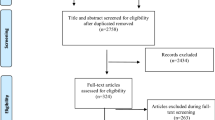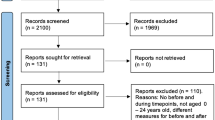Abstract
Purpose
To provide an overview of resilience and protective factors associated with a better life following child maltreatment exposure, to compare protective factors across specific subtypes of maltreatment, and to explore existing issues in the current state of the literature.
Methods
Electronic databases and grey literature up to October 2017 were systematically searched for English language with observational study designs for the research on resilience and childhood maltreatment. Systematic review and qualitative approaches were used to synthesize the results. Study quality and heterogeneity were also examined.
Results
Initial screening of titles and abstracts resulted in 247 papers being reviewed. A total of 85 articles met eligibility criteria of this review. Most of these studies had low or middle study quality. There were two subgroups of studies reviewed: (1) 11 studies examined whether resilience protected against the negative consequence of childhood maltreatment, and, (2) 75 studies explored what protective factor was associated with a kind of adaptive functioning. Although the conceptualization of resilience significantly varied from study to study, protective factors associated with resilience at individual, familial, and societal levels reduced the likelihood of negative consequences of childhood maltreatment. Negative consequences following childhood maltreatment can be prevented or moderated if protective factors are provided in time. Future research needs to address the conceptualization issue of resilience.
Conclusions
Public and population mental health preventions should focus on early childhood and apply preventive strategies as early as possible. Cost-effective studies should be considered in the evaluation of resilience prevention program.


Similar content being viewed by others
References
Butchart A, Harvey AP, Furniss T (2006) Preventing child maltreatment: a guide to taking action and generating evidence. World Health Organization and International Society for Prevention of Child Abuse and Neglect, Geneva
Afifi TO, Macmillan HL (2011) Resilience following child maltreatment: a review of protective factors. Can J Psychiatry 56(5):266–272. https://doi.org/10.1177/070674371105600505
WHO (2012) Media centre: child maltreatment. World Health Organzation, Geneva
Howe ML, Cicchetti D, Toth SL (2006) Children’s basic memory processes, stress, and maltreatment. Dev Psychopathol 18(3):759–769
Ayoub CC, O’Connor E, Rappolt-Schlichtmann G, Fischer KW, Rogosch FA, Toth SL, Cicchetti D (2006) Cognitive and emotional differences in young maltreated children: a translational application of dynamic skill theory. Dev Psychopathol 18(3):679–706
Kim J, Cicchetti D (2006) Longitudinal trajectories of self-system processes and depressive symptoms among maltreated and nonmaltreated children. Child Dev 77(3):624–639. https://doi.org/10.1111/j.1467-8624.2006.00894.x
Li M, D’Arcy C, Meng X (2016) Maltreatment in childhood substantially increases the risk of adult depression and anxiety in prospective cohort studies: systematic review, meta-analysis, and proportional attributable fractions. Psychol Med 46(4):717–730. https://doi.org/10.1017/S0033291715002743
Masten AS, Cicchetti D (2010) Developmental cascades. Dev Psychopathol 22(3):491–495. https://doi.org/10.1017/S0954579410000222
Kendall-Tackett KA, Williams LM, Finkelhor D (1993) Impact of sexual abuse on children: a review and synthesis of recent empirical studies. Psychol Bull 113(1):164–180
Domhardt M, Munzer A, Fegert JM, Goldbeck L (2015) Resilience in survivors of child sexual abuse: a systematic review of the literature. Trauma Violence Abuse 16(4):476–493. https://doi.org/10.1177/1524838014557288
Cicchetti D (2010) Resilience under conditions of extreme stress: a multilevel perspective. World Psychiatry 9(3):145–154
Daigneault I, Hebert M, Tourigny M (2007) Personal and interpersonal characteristics related to resilient developmental pathways of sexually abused adolescents. Child Adolesc Psychiatr Clin N Am 16(2):415–434. https://doi.org/10.1016/j.chc.2006.11.002x
Rutter M (1985) Resilience in the face of adversity. Protective factors and resistance to psychiatric disorder. Br J Psychiatry 147:598–611
Heller SS, Larrieu JA, D’Imperio R, Boris NW (1999) Research on resilience to child maltreatment: empirical considerations. Child Abuse Negl 23(4):321–338
Haskett ME, Nears K, Ward CS, McPherson AV (2006) Diversity in adjustment of maltreated children: factors associated with resilient functioning. Clin Psychol Rev 26(6):796–812. https://doi.org/10.1016/j.cpr.2006.03.005
Herrmann D, Scherg H, Verres R, von Hagens C, Strowitzki T, Wischmann T (2011) Resilience in infertile couples acts as a protective factor against infertility-specific distress and impaired quality of life. J Assist Reprod Genet 28(11):1111–1117. https://doi.org/10.1007/s10815-011-9637-2
Dufour MH, Nadeau L, Bertrand K (2000) Resilience factors in the victims of sexual abuse: state of affairs. Child Abuse Negl 24(6):781–797
Moher D, Liberati A, Tetzlaff J, Altman DG, Group P (2009) Preferred reporting items for systematic reviews and meta-analyses: the PRISMA statement. BMJ 339:b2535. https://doi.org/10.1136/bmj.b2535
Higgins JP, Thompson SG, Spiegelhalter DJ (2009) A re-evaluation of random-effects meta-analysis. J R Stat Soc Ser A Stat Soc 172(1):137–159. https://doi.org/10.1111/j.1467-985X.2008.00552.x
Cicchetti D, Toth SL (1995) A developmental psychopathology perspective on child abuse and neglect. J Am Acad Child Adolesc Psychiatry 34(5):541–565. https://doi.org/10.1097/00004583-199505000-00008
Cicchetti D (2013) Annual research review: resilient functioning in maltreated children—past, present, and future perspectives. J Child Psychol Psychiatry 54(4):402–422. https://doi.org/10.1111/j.1469-7610.2012.02608.x
Cicchetti D (2016) Socioemotional, personality, and biological development: illustrations from a multilevel developmental psychopathology perspective on child maltreatment. Annu Rev Psychol 67:187–211. https://doi.org/10.1146/annurev-psych-122414-033259
Shonkoff JP, Boyce WT, McEwen BS (2009) Neuroscience, molecular biology, and the childhood roots of health disparities: building a new framework for health promotion and disease prevention. JAMA 301(21):2252–2259. https://doi.org/10.1001/jama.2009.754
Nanni V, Uher R, Danese A (2012) Childhood maltreatment predicts unfavorable course of illness and treatment outcome in depression: a meta-analysis. Am J Psychiatry 169(2):141–151. https://doi.org/10.1176/appi.ajp.2011.11020335
Trickett PK, Noll JG, Putnam FW (2011) The impact of sexual abuse on female development: lessons from a multigenerational, longitudinal research study. Dev Psychopathol 23(2):453–476. https://doi.org/10.1017/S0954579411000174
Ganzel BL, Morris PA, Wethington E (2010) Allostasis and the human brain: Integrating models of stress from the social and life sciences. Psychol Rev 117(1):134–174. https://doi.org/10.1037/a0017773
Luthar SS, Cicchetti D, Becker B (2000) The construct of resilience: a critical evaluation and guidelines for future work. Child Dev 71(3):543–562
Edwards KM, Probst DR, Rodenhizer-Stampfli KA, Gidycz CA, Tansill EC (2014) Multiplicity of child maltreatment and biopsychosocial outcomes in young adulthood: the moderating role of resiliency characteristics among female survivors. Child Maltreat 19(3–4):188–198. https://doi.org/10.1177/1077559514543354
Walsh K, Blaustein M, Knight WG, Spinazzola J, van der Kolk BA (2007) Resiliency factors in the relation between childhood sexual abuse and adulthood sexual assault in college-age women. J Child Sex Abus 16(1):1–17. https://doi.org/10.1300/J070v16n01_01
Liang B, Williams LM, Siegel JA (2006) Relational outcomes of childhood sexual trauma in female survivors: a longitudinal study. J Interpers Violence 21(1):42–57. https://doi.org/10.1177/0886260505281603
Banyard VL, Williams LM, Siegel JA (2002) Re-traumatization among adult women sexually abused in childhood: exploratory analyses in a prospective study. J Child Sex Abus 11(3):19–48
Lam JN, Grossman FK (1997) Resiliency and adult adaptation in women with and without self-reported histories of childhood sexual abuse. J Trauma Stress 10(2):175–196
Wahab S, Tan SM, Marimuthu S, Razali R, Muhamad NA (2013) Young female survivors of sexual abuse in Malaysia and depression: what factors are associated with better outcome?. Asia Pac Psychiatry 5(Suppl 1):95–102. https://doi.org/10.1111/appy.12051
Wilson L, Scarpa A (2014) Childhood abuse, perceived social support, and posttraumatic stress symptoms: a moderation model. Psychol Trauma Theory Res Pract Policy 6:512–518. https://doi.org/10.1037/a0032635
Elkins J (2011) Developmental outcomes in a nationally representative sample of sexually abused boys: the moderating influence of family and peer context. Dissertation, Columbia University
Bruggen L (2011) Romantic relationships in young women with a history of child maltreatment: examining the role of mentoring relationships as a protective factor. Dissertation, University of Victoria
Traina D (2008) Resilience in mothers who had been victims of physical child abuse: an exploration of the mediating effects of personality characteristics, coping skills, social support, and family characteristics. Dissertation, Seton Hall University
MCclure F, Chavez D, Agars M, Peacock M, Matosian A (2008) Resilience in sexually abused women: risk and protective factors. J Fam Violence 23:81–88. https://doi.org/10.1007/s10896-007-9129-4
Moran PB, Eckenrode J (1992) Protective personality characteristics among adolescent victims of maltreatment. Child Abus Negl 16(5):743–754
Rutter M (2012) Resilience as a dynamic concept. Dev Psychopathol 24(2):335–344. https://doi.org/10.1017/S0954579412000028
Funding
Dr. Meng received the start-up fund from Douglas Mental Health University Institute and a Scholar Award from the Fonds de recherche du Québec–Santé. This study was also supported by a Canadian Institute of Health Research Grant (PJT-148845).
Author information
Authors and Affiliations
Corresponding author
Ethics declarations
Conflict of interest
The authors declared no potential conflicts of interest with respect to the research, authorship, and/or publication of this article.
Electronic supplementary material
Below is the link to the electronic supplementary material.
Rights and permissions
About this article
Cite this article
Meng, X., Fleury, MJ., Xiang, YT. et al. Resilience and protective factors among people with a history of child maltreatment: a systematic review. Soc Psychiatry Psychiatr Epidemiol 53, 453–475 (2018). https://doi.org/10.1007/s00127-018-1485-2
Received:
Accepted:
Published:
Issue Date:
DOI: https://doi.org/10.1007/s00127-018-1485-2




